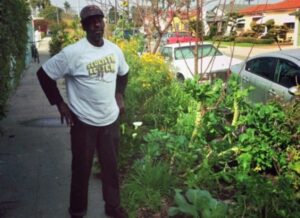Urban Farmers Take it to the Curb with Curbside Farming

Urban farmers are pioneering a new curbside trend for raising produce, planting fruits, vegetables and herbs on the tiny strips of grass that run beside city streets – nevermind the fact that it’s illegal. Would you grow fruit and vegetables on the curb in front of your home?
In cities like Los Angeles where the weather is ideal for farming yet arable land is scarce, intrepid urban farmers and other green-thumbed citizens are turning the overlooked tufts of grass and soil found along curbs into gardens for the community. Growing herbs, vegetables and fruits, these small hand-planted gardens are a bounty for poorer neighborhoods like South Central, areas where fast food outlets abound but fresh produce in grocery stores can be scarce.
Often organic, these renegade gardens not only produce cheap, healthy food for citizens to eat, but they also provide a creative green outlet for people otherwise surrounded by concrete. Recalling the “Victory Gardens” from the eras of the World Wars, these skinny street side gardens offer a way for consumers to become creators. In urban areas where yards are scarce, curbs are sometimes the only specks of earth available for cultivation, and their public location makes it easy for communities to share the harvest and get to know one another.
There’s only one problem, however: these gardens are illegal. While the LA city council no doubt wants to promote healthy eating in theory, the reality of the matter is that planting anything besides grass on curbsides is forbidden by city code. Growing grass is allowed, and that’s it. Citizens can spend thousands of dollars and gallons of water to keep their curbside areas grassy and bright green and aesthetically pleasing, but if any kind of produce is planted in these areas, it becomes illegal. Planting much of anything in fact on these city-owned curbs requires an expensive permit, which takes some time to acquire. While the law catches up to progress, however, citizens are planting curbside gardens anyway and ignoring the rules in a very LA fashion.
Los Angeles boasts an ideal climate for urban cultivation that features a long, warm growing season that never seems to end. However, other locations are warming up to the idea of curbside farming, too. Newark, New Jersey has a progressive urban agriculture program funded by federal grants, while a Detroit businessman attempts to turn his city’s vacant lots into farms. Working to localize the global food supply, the organization UrbanFarming.org now lists more than 60,000 residential and community gardens. Thanks to the current D-I-Y trend and the slouching economy, more people than ever before are interested in gardening at home. Curbside gardens provide the soil to grow produce and the space to grow communities.
Besides the heavy hand of the law, curbside gardens face another problem that no one seems to address: dogs. Any dog owner living in the city would be loathe to chow down on lettuce grown curbside due to the proliferation of dog pee that fountains any growing object on any city street, thanks to our leg-lifting best friends.
Would you curbside farm? Whatever your answer, it looks like this urban gardening trend is here to stay.
Resources:
http://online.wsj.com/article/SB10001424127887323699704578326840038605324.html
http://farmscapegardens.com/blog/los-angeles-urban-farming-capital-us
http://farmscapegardens.com/blog/los-angeles-urban-farming-capital-usImage: TED

